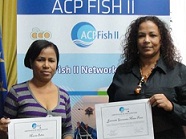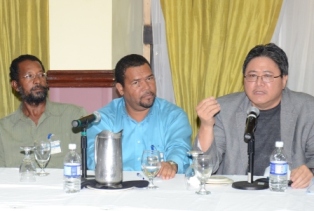NEWS: ACP Fish II Programme Advancing the CARIFORUM Agenda
 Kingston, 29 November 2011/ ACP Fish II: The CARIFORUM agenda was further advanced when more than 80 persons across the Caribbean in fisheries administration, research, fisherfolk organisations and business gathered in Kingston, Jamaica to promote the Caribbean Community Common Fisheries Policy (CCCFP). The Policy, which is an overarching set of guidelines and principles aimed at regional co-operation in the management of the shared marine ecosystem is soon to be a reality for CARICOM.
Kingston, 29 November 2011/ ACP Fish II: The CARIFORUM agenda was further advanced when more than 80 persons across the Caribbean in fisheries administration, research, fisherfolk organisations and business gathered in Kingston, Jamaica to promote the Caribbean Community Common Fisheries Policy (CCCFP). The Policy, which is an overarching set of guidelines and principles aimed at regional co-operation in the management of the shared marine ecosystem is soon to be a reality for CARICOM.
“The Draft Agreement Establishing the CCCFP was received by the Special Meeting of the Council for Trade and Economic Development (COTED) on October 2011 in Dominica. The COTED recommended that the Draft Agreement be reviewed by the CARICOM Legal Affairs Committee which will then forward the Policy for the consideration of Heads of Government through the appropriate channel”, advised Ms. Safiya Ali, Acting General Counsel of the CARICOM Secretariat.
The Policy further sets the framework and key principles for the culturing and harvesting of fish and other marine resources as provided for by the Revised Treaty of Chaguaramas and other international instruments. “It sets standards for regulation, licensing and management at the national level with a view to achieving harmonisation of legislation and practices. This brings the fisheries sector in line with treaty provisions in relation to trade policy and provides the basis for future elaboration of a community-managed regime”, said Ms. Ali.
Collective Responsibility Needed
The Caribbean Regional Fisheries Mechanism (CRFM) was established in 2002 by the CARICOM Heads of Government as the competent agency to promote regional development and management of fisheries and aquaculture. Speaking at the Network Meeting, the CRFM’s Executive Director Designate, Mr. Milton Haughton, lauded the European Union’s support for regional efforts as he called on Caribbean states to rise to the challenge of putting in place the requisite policies, laws and regulations to conserve, protect and utilise the region’s fisheries resources in a sustainable and optimum manner.
“Within the Caribbean it is widely accepted that existing policy, legal and institutional framework are out-dated and inadequate to deal with today’s complex issues and challenges in fisheries. At this time, Antigua and Barbuda, Belize along with Jamaica as well as Trinidad and Tobago are at fairly advanced stages in the process of updating their national fisheries legislation”, mentioned Mr Milton Haughton of the CRFM.
This commitment to Caribbean integration for the protection of its economic zone was reaffirmed by the European Union Charge d’ Affaires, Mrs Helen Jenkinson. According to Mrs Jenkinson, this support has been demonstrated not only for the EU’s backing of the ACP Fish II Programme but, additionally providing financial aid for climate change and watershed management and mangrove forests among further efforts to support fisheries.

“The Economic Partnership Agreement (EPA) has looked at sanitary standards in the context of trade. Fish exporters can also consider that area for additional support to get technical backing and information on standards supported by the EU”, said Mrs Jenkinson.
Also giving support for the Common Fisheries Policy is the Caribbean Network for Fisherfolk Organisations (CNFO) that represents fishers in the region. Mr Mitchell Lay, Coordinator for the CNFO is very pleased to be a part of the development of the Policy as the contributions of fishers across the region has been assimilated. “This is a result of being integrated within the governance structure of national organisations to provide a united front for networking, representation and capacity building at the regional level for marketing and trade”, commented Mr Lay.
Providing another Caribbean perspective was Mr Harold Guiste, Senior Fisheries Officer from the Commonwealth of Dominica. According to Mr Guiste, CARIFORUM member states need each other to cope with the challenges of marine and ocean management to survive as island states as seen from the benefits in the common fisheries surveillance zone still in force in the Organisation of Eastern Caribbean States (OECS) and, which needs to be duplicated in the wider Caribbean.
Jamaica’s Director of Fisheries, Mr Andre Kong agrees with his colleagues that the Common Fisheries Policy confirms the commitment of member states to address the issues identified in the Policy and provides the opportunity for the mobilisation of resources for national and regional projects. “Additionally, the Policy provides the Caribbean with one voice on the world stage to tackle the critical issues that affect CARICOM members states such as survival and safety at sea and illegal, unregulated and unreported fishing (IUU)”, said Mr Kong.
ACP Fish II Regional Workshop A Success 
The network meeting in Jamaica was held in the context of the Third Regional Programme Monitoring and Training Workshop. Based on feedback provided by the participants, Regional Programme Manager for the Caribbean, Dr Sandra Grant has lauded the Workshop as a success.
“Having reviewed the implementation of projects in phase one, coupled with training in the development of Terms of References (ToRs), we have been able to build the capacity of focal points across the region in the practical implementation of stages of the project cycle along with needs identification for fisheries projects. One of the main highlights of this exercise was the identification of the need for national and sub-regional plans of action for IUU fishing”, said Dr Grant as she summarised the need for regional collaboration for the management of shared resources to ensure sustainability and success of the Fish II initiative.
The
-END-
(Photos: DR representatives Fisheries (Codopesca)Assistant director Marcia Beltre and Director Jannette Mateo; Participant group; PanellistsMitchell Lay, Harold Guist, Andre Kong at the conference.)
For further information please contact: ACP Fish II Programme Regional Manager for the Caribbean Region, Sandra Grant;
E-Mail: s.grant@acpfish2-eu.org; Telephone: 011(501) 223 2974/Fax: 011(501) 223 2975
For further information on the ACP Fish II Programme: Please visit: http://www.acpfish2-eu.org
